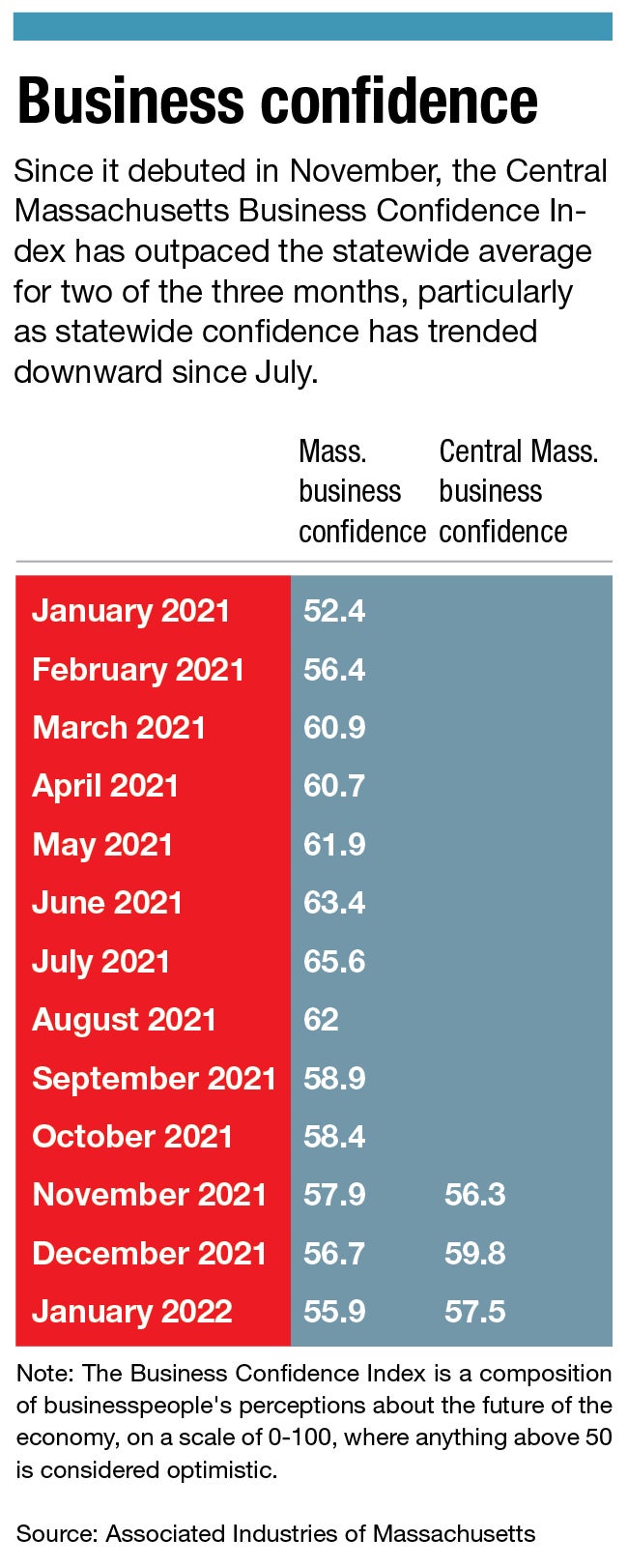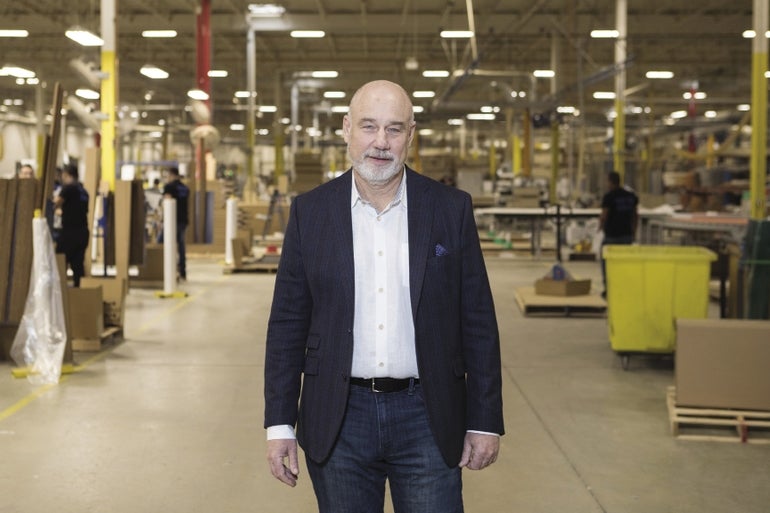Although it’s practically brand new, the Central Massachusetts Business Confidence Index has revealed employer attitudes in the region are trending more optimistic than the rest of the state.
Get Instant Access to This Article
Subscribe to Worcester Business Journal and get immediate access to all of our subscriber-only content and much more.
- Critical Central Massachusetts business news updated daily.
- Immediate access to all subscriber-only content on our website.
- Bi-weekly print or digital editions of our award-winning publication.
- Special bonus issues like the WBJ Book of Lists.
- Exclusive ticket prize draws for our in-person events.
Click here to purchase a paywall bypass link for this article.
Although it’s practically brand new, the Central Massachusetts Business Confidence Index has revealed employer attitudes in the region are trending more optimistic than the rest of the state.
In November, Boston-based trade organization Associated Industries of Massachusetts released the first-ever Business Confidence Index focused specifically on Greater Worcester. While statewide business confidence has notched down over the last six months and hit a 10-month low in January, Central Massachusetts has appeared insulated from these declining attitudes.
The region’s index has been on the rise since the report’s launch. In January, Central Massachusetts had the highest ranking at 57.5 on a 100-point scale, compared with 54.5 in the four western counties, 56.6 in the northeast, 52 in the Boston area, and 49.2 in Cape Cod and islands, said Chris Geehern, executive vice president of AIM. The scores are reflective of businesspeople’s confidence in the future of the economy, where scores over 50 are considered positive.
In February, Central Massachusetts had a 58.1 rating, 1.4 points higher than the statewide average.
The BCI was created in 1991 for Massachusetts, but in the last year AIM has made an effort to break down the data by region by collaborating with individual business associations, like the Worcester Regional Chamber of Commerce.
“We talk about the Massachusetts economy sometimes as a monolith,” said Geehern. “There are regional differences in terms of the industry mix and the technology mix.”

Central Mass. standing out
Industry mix may be one of the main contributing factors to why confidence has been slightly higher in Central Massachusetts than the rest of Massachusetts.
Central Massachusetts has a higher percentage of manufacturing and construction jobs than the state as a whole, with the two industries making up roughly 14% of the region’s nonfarm jobs, as opposed to less than 12% statewide, according to the U.S. Bureau of Labor Statistics.
“It’s fair to say that manufacturing and construction companies are generally more bullish about the economy now than service companies or companies in the hospitality industry,” said Geehern. “These companies have certainly been affected by Omicron in terms of absenteeism, but less affected in terms of the markets they serve.”
Government policy played a hand in keeping manufacturers on their feet, as well, said Bruce Platzman, CEO of Leominster office furniture manufacturer AIS.
“Central Mass., for the most part, has a large manufacturing base that was able to remain open during COVID for the last two years,” Platzman said.
Local manufacturers saw a rise in demand because other states were burdened by more intense lockdowns, said Platzman. Most of AIS’s competitors are located in Michigan, where office supply manufacturers were not considered essential. Meanwhile, Gov. Charlie Baker designated AIS as essential, allowing the firm to pick up a portion of its competitors’ business.
“Surprisingly, we by far had our best year last year,” Platzman said, explaining that top line sales were as high in 2021 as they were before COVID-19. “There was a lot of pent-up demand that we’ve been able to work through and enjoy that.”
Construction contractors have seen a similarly positive year, as one of the fastest growing industries in the region. Construction jobs in Central Massachusetts grew 15% in 2021, significantly higher than the statewide 6.2% growth rate for the industry.

“I’ve noticed an increase in the work in Central Massachusetts,” said Charran Fisher, owner of Fisher Contracting Corp. in Worcester. “Especially in Worcester, there’s just been a lot of development, which for me is equivalent to more work.”
Fisher’s company will start on UMass Chan Medical School’s New Education and Research Building, a nine-story, $325-million project on Plantation Street in Worcester, and is finishing up work on a 350-car parking garage near the Polar Park baseball stadium.
The service industry remains more vulnerable, as it relies on consumer confidence, as well as employer attitudes.

“The consumer support coming from our community is what's going to be the best indicator for how we move forward as an industry,” said Nicole Broushet, who owns The Vegan Nest Café in Worcester and Clinton. “It's really going to rely a lot on consumer confidence in coming in and supporting our local restaurants.”
Leisure and hospitality has been on the rise in Central Massachusetts but is growing considerably faster statewide. The industry's growth rate was 10 percentage points higher for the state than for the Central Massachusetts region, according to BLS, indicating the rest of the state may still be solidly in the pandemic recovery process. For areas in Boston and the Cape where the service industry makes up more of the economy, business confidence is lower.
Broushet said, along with consumers, municipal governments offering support helped her maintain her restaurant while she pivoted her business model to be more pandemic-resilient.
Quantifying confidence
While business confidence has important impacts on employer decisions, it can be challenging to quantify and its measurement isn’t fail-safe, especially in its early stages.
“Confidence is not something that's very factual. It's a feeling – what people think is going to happen,” Platzman said.
AIM surveys employers monthly, collecting data on their size, hiring rates, sales rates, and confidence on a local and national scale. The questionnaire includes a free answer section where respondents can describe unique challenges and concerns as they arise.
While statewide numbers can be compared against 30 years of data, the brand new localized measures should be taken with a grain of salt, said Geehern.
“We have to be careful about reading too much into three months of data,” Geehern said. “These readings tend to be somewhat volatile month to month.”
While Central Massachusetts’ was the first regional reading to be developed, AIM has partnered with business associations in Western Massachusetts and the North Shore to develop more localized indexes.
“Confidence among employers drives investment decisions, capital decisions, hiring decisions, expansion decisions,” said Geehern. “To the extent that we can focus that down in a region, that’s going to be very helpful, both to us and to the chambers, but also hopefully to public policy folks as they work on economic issues.”

